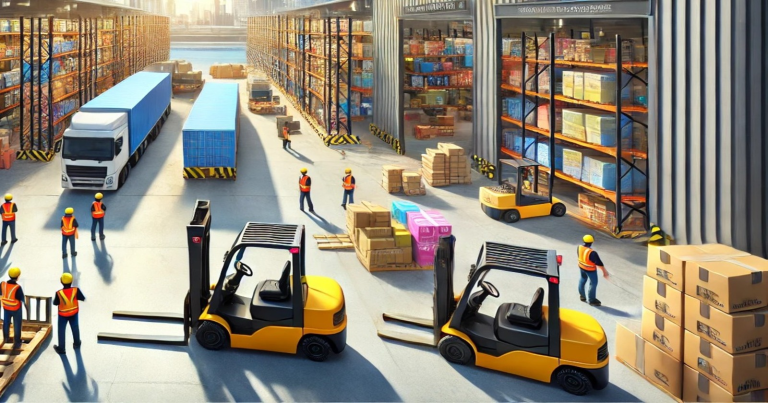Wholesale trade is very essential in the supply chain. It links the manufacturers to retailers and large consumers. Wholesale trade involves buying goods in bulk from producers and selling the same in small quantities to retailers, businesses, or other wholesalers. It does not sell its products directly to the final consumer. Instead, it acts as a middle link between the producer and the retailer to ensure goods reach the market efficiently. Imagine a massive warehouse containing thousands of products. Wholesale trade plays a vital role. It lessens the task of the manufacturers as the wholesalers take the distribution job. Wholesalers are entrusted with the storage and transportation facilities and a little marketing. It helps the retailers as there is no need to deal with multiple manufacturers while providing them various products for sale. This whole system saves time, reduces costs, and ensures the availability of products in the market.
What is Wholesale Trade?
Wholesale trade involves buying large quantities from producers and selling them in bulk to retailers, businesses, or other wholesalers. Often, wholesalers do not sell directly to consumers. Their prominent role is to distribute products as efficiently as possible from manufacturers to those who sell the goods to the final buyers.
Wholesalers buy goods in enormous quantities, at times at wholesale prices, due to the reduced cost per unit. They then store these products in large warehouses. They then sell them to retailers or other businesses in small bulk quantities larger than what a common consumer would buy.
Forms of Wholesale Trade
- Merchant Wholesalers: They purchase goods, own them, store them, and sell them to others.
- Agents and Brokers: They do not own the goods but help sellers and buyers make deals and earn commissions.
Objectives of Wholesale Trade
The objectives of wholesale trade are essential for the smooth functioning of the supply chain. Wholesale trade serves several key purposes that help both producers and retailers. Wholesale trade facilitates products to reach different regions and markets. Wholesalers have a network of retailers in cities, states, or even countries. This expands the market for producers and helps products reach customers far from the production site.
Efficient Distribution of Goods
Quick distribution of products across markets: With wholesalers, manufacturers do not have to bother hundreds of retailers one by one. This saves manufacturers a lot of time and money.
Reduction in burden on manufacturers
Manufacturing businesses focus on producing commodities. They do not have the time and capital to manage storage, transport, and sell their product to numerous small retailers. Wholesale trade helps ease this burden. Wholesale traders will handle huge orders, storage, transportation, and marketing exercises. This, therefore, creates room for the producers to focus on the production.
Bulk Supply of Commodities to Retailers
Retailers need products in quantities larger than individual consumer needs but smaller than what manufacturers supply. Wholesale trade fills this gap. Wholesalers split large manufacturer shipments into smaller bulk orders suitable for retailers. This ensures that retailers always have enough stock to meet customer demand.
Price Stabilization
Wholesale trade stabilises prices in the market. Wholesalers buy large quantities when prices are low and store the goods. They release them gradually to the market, preventing sudden price increases due to shortages. This helps maintain stable prices for consumers.
Financial Support to Retailers
Wholesalers often offer credit facilities to retailers. This means that the retailers can buy commodities on credit and pay after selling them. This form of financial support helps small retailers ensure proper cash flow management.
Characteristics of Wholesale Trade
Characteristics of wholesale trade explain how wholesale trade operates in the supply chain. The defining attributes of wholesale trade differentiate it from retail trade and explain why it is an important component of the economy. In this regard, wholesalers manage the supply of goods in the market and regulate the prices by holding back stock in surplus supply and releasing it during peak demand times to avoid price fluctuation.
Mass Purchase and Sale
The wholesaler buys in big bulk from manufacturers. It then sells to a retailer or business in small lots of that quantity. This volume decreases the price per unit, so there is room for more profitable margins.
It Does Not Directly Deal with Final Consumers
Wholesalers deal with B2B transactions. The wholesalers sell to the retailers but not directly to the consumers. This is the most essential difference between wholesalers and retailers. Wholesalers deal in large quantities. They must have large-sized warehouses, perfect logistic systems, and robust supply networks to handle the large volumes they deal with.
Specialization
Most wholesalers specialise in particular product lines. For example, some only deal with electronics, while others deal with clothing, food, or construction materials. This specialisation lets them know the market well and serve their clients effectively.
Offering Credit Facilities
Wholesalers offer credit to most of their clients, who are usually retailers. This enables retailers to buy products without paying cash immediately, making it easier to manage their business finances.
Risk Bearing
Wholesalers have the risks of price change, damage while storing, and stock left over unsold. To a wholesaler, products are purchased in huge quantities and are kept in inventory for some considerable period; hence, they run risks of reduced demand in the market, rotting for perishable products, etc.
Knowledge of the Market
Wholesalers know the market trends, demand, and supply conditions well. They collect information from producers and retailers to make proper decisions about buying and selling.
Advantages of Wholesale Trade
Wholesale trade has many benefits for producers, retailers, and the economy. Such advantages make it an integral part of the supply chain. Buying in bulk reduces the cost per unit. Wholesalers get discounts from manufacturers because of large orders, which enables them to sell at competitive prices. This cost-efficiency benefits both wholesalers and retailers.
Simplified Distribution
Wholesale trade simplifies the distribution process. Manufacturers sell large quantities to a few wholesalers instead of dealing with hundreds of retailers. Wholesalers then distribute to various retailers, making the supply chain more efficient.
Financial Support to Retailers
Wholesalers offer credit facilities to retailers. Retailers can purchase goods without paying at the time of purchase. It helps small businesses manage their cash flow and not put too much pressure on retailers’ financial resources.
Risk Reduction for Producers
Producers face risks regarding unsold merchandise and volatile demand. The wholesale business reduces this risk because the wholesaler purchases many goods upfront. The wholesaler absorbs the risks of selling these products, thus lessening the risk for producers.
Market Expansion
Wholesalers have long supply lines. Wholesalers assist manufacturers in reaching a market that would be otherwise inaccessible. This means that sales and market increase for the producers.
Concentration on Core Activities
As wholesalers care for distribution, storage, and even promotion, manufacturers can focus on their core activity of producing goods. This divides labour and has the benefits of increasing efficiency and productivity.
Difference Between Wholesale Trade and Retail Trade
Wholesale and retail trade are the two parts of the distribution process, though the functions operate differently. This helps explain how they uniquely serve in the supply chain.
Wholesale trade is buying large quantities from producers and selling them in bulk to retailers or other businesses. On the other hand, retail trade sells goods directly to the final consumer in small quantities.
| Aspect | Wholesale Trade | Retail Trade |
| Nature of Business | Buys in bulk from producers, sells to retailers | Buys from wholesalers, sells to consumers |
| Quantity of Goods | Large quantities | Small quantities |
| Customer | Retailers, businesses | Final consumers |
| Location | Often located in business districts | Located near residential areas |
| Role in Supply Chain | Acts as a link between producer and retailer | Acts as a link between wholesaler and consumer |
| Credit Facilities | Provides credit to retailers | Rarely provides credit to consumers |
| Risk Bearing | Bears risks related to bulk buying and storage | Bears risks related to unsold stock and changing consumer preferences |
| Focus | Focuses on distribution and bulk sales | Focuses on customer service and sales |
Wholesale Trade FAQs
What is wholesale trade?
Wholesale trade is purchasing huge quantities of commodities from manufacturers and selling them to retailers, business concerns, or other wholesalers.
What are the objectives of wholesale trade?
The objectives of wholesale trade include efficient distribution of goods, reduction of burden on manufacturers, giving credit to retailers, stabilizing prices, and widening market.
What are the characteristics of Wholesale trade?
Its key characteristics are bulk buying and selling, with no direct contact with consumers, large-scale operation, and specialization in specific products.
What are the differences between wholesale and retail trade?
Wholesale trade concerns bulk purchases and sales among producers and retailers. On the other hand, retail trade is the direct sale of products to final consumers in small lots.
What are the advantages of wholesale trade?
Wholesale trade provides cost efficiency, simplifies distribution, provides financial support to retailers, reduces risks for manufacturers, and helps stabilize prices in the market.


